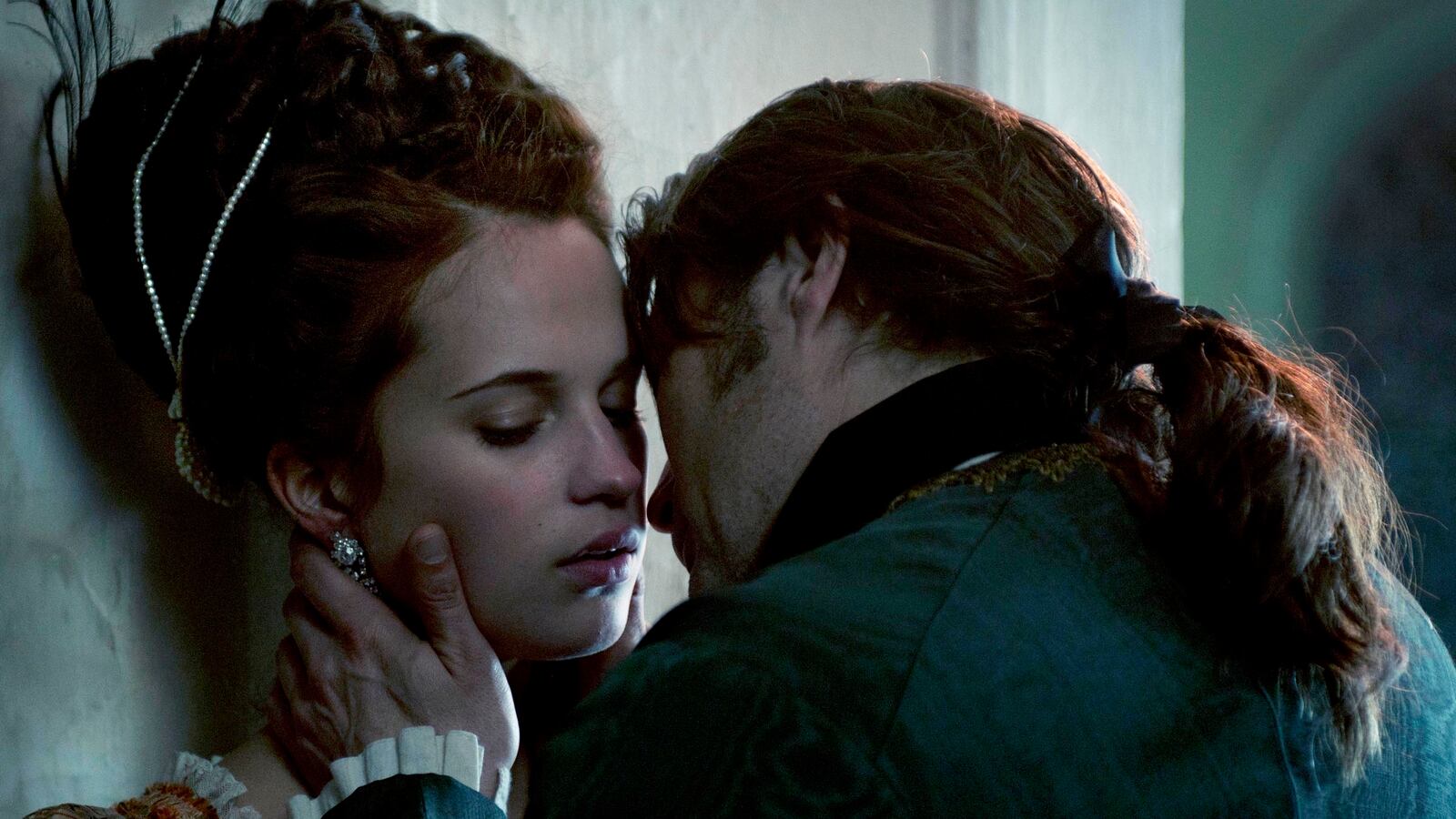On paper it sounds like an odd hybrid: A Royal Affair, Denmark’s official submission for this year’s foreign-language Oscar, is a cross between an old-fashioned romantic epic and a hard-edged political drama. Director and co-writer Nikolaj Arcel calls the film “David Lean meets Dogme.” The combination proves to be combustible.
Danish students are all taught the history lesson that this film provides—the story of the upheavals that shook the court of King Christian VII in the late 18th century, at the same time that revolutions were brewing in America and France. But to U.S. audiences, the story will be a fresh and fascinating one. “Powers were shifting all over the world,” Arcel comments. “The difference in Denmark was that this mini-revolution came from the top of society. A few years later, the peasants revolted in France.” Both countries were responding to the ideas of radical thinkers like Voltaire, Thomas Paine, and Jean-Jacques Rousseau. There were additional parallels between England and Denmark. During the time of the American Revolution, England was ruled by George III, who has become known (partly as a result of the play and movie The Madness of King George) for his mental instability. King Christian of Denmark was also said to be a mad king, though Arcel feels that label is a bit simplistic. The revolt at his court was instigated by the court physician, who was having an affair with the king’s wife. Queen Caroline happened to be the younger sister of King George III. “We didn’t mention that in the movie, because we felt audiences would never believe it,” Arcel says.
In Denmark, the queen and the doctor, Johann Struensee, eventually encouraged the impressionable king to introduce major reforms that benefited ordinary citizens. But they were challenging many other leaders at the court who wanted to retain their privileges. The film details a battle between youthful voices of freedom and more authoritarian factions within the palace. As Arcel observes, “It’s amazing how little has changed, which is fascinating but scary.” He started work on the script before the Arab Spring, but says he felt those events only verified the timeliness of the chronicle of enduring tensions between conservative and progressive forces. “My main attraction here was to the politics of the story,” Arcel confirms.
Some of his earlier films also had strong political undercurrents. His first feature, King’s Game, in 2004 was inspired by American political thrillers. He and his writing partner, Rasmus Heisterberg, also wrote the screenplay for the enormously successful Swedish version of The Girl With the Dragon Tattoo, which is at its heart the story of a youthful iconoclast up against the forces of right-wing repression in contemporary Sweden.

Both Dragon Tattoo and A Royal Affair have very strong-minded female characters at the center of the story. Queen Caroline is played by a talented and beautiful young Swedish actress, Alicia Vikander, who responded to the feminist angle of this story. “When I was doing research for the part,” Vikander says, “I found a treasure in the letters that Caroline wrote to her family after she went to Denmark to marry the king. At first I wasn’t sure how much the doctor influenced her radical ideas. But she was quoting Rousseau and Voltaire in her letters when she was only 16, before she ever met the doctor. The tragedy was that she wasn’t allowed to keep her books, because all of the leaders at the court were threatened by the idea of an independent woman. When she went to Denmark, she thought she was going to marry Prince Charming. But she realized she could never have a meaningful relationship with the man she married. She had to cage her own feelings.”
Arcel made a shrewd decision in casting newcomers alongside Denmark’s biggest star, Mads Mikkelsen, as the radical physician. Arcel had never met Mikkelsen, but he sent him the script, and Mikkelsen responded immediately. Mikkelsen has appeared in Hollywood films, most memorably as the villain in the recent James Bond movie Casino Royale. But he gets to play the romantic hero in A Royal Affair.
With Mikkelsen as his security blanket, Arcel could cast the other two roles with new faces. Mikkel Boe Følsgaard, who plays the volatile young king, was in drama school when Arcel met him. “He had not played one part in theater or film, but when I saw him, I knew he would be perfect,” the director says. Vikander had worked for nine years as a dancer when she decided that acting was her true passion. Still in her early 20s, she won the leading role in a Swedish film called Pure three years ago, but it had not yet been released when Arcel chose her for the role of Caroline after a long, intensive casting process. When Pure came out, she won the best-actress award in Sweden, and Joe Wright subsequently cast her in the pivotal role of Kitty in his new screen version of Anna Karenina. Vikander has also done another English-language film, The Seventh Son, costarring Julianne Moore and Jeff Bridges, which will be released next year.
Arcel claims an eclectic set of influences. He was a film student when the first Dogme films were released, when Danish filmmakers pioneered a more intimate and naturalistic approach to storytelling. (Dogme innovator Lars von Trier is one of the executive producers of A Royal Affair.) But when he began his own career, Arcel went in a different direction. “My generation could look up to these new Danish filmmakers,” Arcel reflects. “They gave our country an international reputation. But the Dogme movement was peaking when I graduated, and I felt I would be copying other people if I made Dogme films. So I went back to my original love of American movies.”
As a kid, E.T. was his favorite movie, and Arcel says he continued to be inspired by American films. “People have compared A Royal Affair to the British Masterpiece Theatre productions,” he says, “but I didn’t feel that was really my influence. I was looking back to Hollywood films of the 1950s and ’60s. I’m a David Lean nut, partly because we can only dream of making his kind of film today.”
While he hoped to emulate the scope of those earlier films, he also aimed for a rawness that those Hollywood epics didn’t have. “I didn’t want it to feel stuffy,” Arcel says simply. Vikander elaborates, “Nikolaj’s vision was to make a costume drama but not let the costumes get in the way. We didn’t wear much makeup. The wigs are smaller than they actually would have been at the time. We didn’t want to lose the human story.”
The film has been getting enough attention to propel the careers of both the actress and the director. Arcel now has a house in the Hollywood Hills, and he is excited by the prospect of joining the company of other European directors who made a successful transition to American films. “I’ve always had a dream of living in America,” he says. “Denmark can seem very small and flat.” Contemporary American movies could certainly benefit from the passion that suffuses A Royal Affair.






